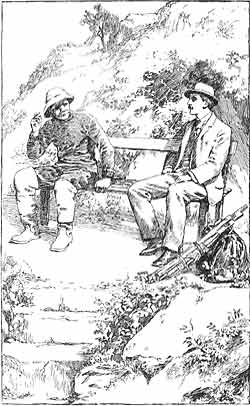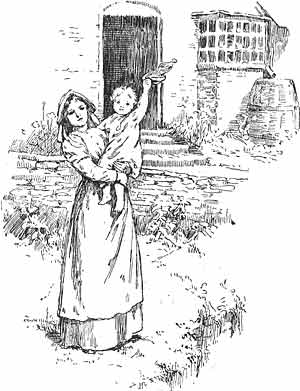Little John
After admiring the beauties of my new surroundings for some little time, I felt that I must begin to look for quarters. I was anxious, if possible, to find a lodging in one of the cottages, and then, after a good night’s rest, I would carefully select a good subject for my picture. I called at several houses, where I noticed a card in the window announcing “Apartments for Rent,” but I met the same answer everywhere, “Full, sir, quite full.” In one place I was offered a bed in the kitchen, but the whole place smelt so strongly of fried herrings and of fish oil, that I felt it would be far more pleasant to sleep on the beach than to attempt to do so in that close and unwholesome atmosphere.
After wandering up and down for some time, I passed a house close to the village green, and saw the children with whom I had travelled sitting at tea close to the open window. They, too, were eating herrings, and the smell made me hungry. I began to feel that it was time I had something to eat, and I thought my best plan would be to retrace my steps to the hotel which I had passed on my way, and which stood at the very top of the high cliff. I turned a little lazy when I thought of the climb, for I was tired with my journey, and, as I said before, I was not very strong. To drag my bag and easel up the rugged ascent would require a mighty effort at the best of times. I noticed that wooden benches had been placed here and there on the different platforms of the rock, for the convenience of the fishermen, and I determined to rest for a quarter of an hour on one of them before retracing my steps up the steep hill to the hotel. The fishermen were filling most of the seats, sitting side by side, row after row of them, talking together, and looking down at the beach below. As I gazed up at them, they looked to me like so many blue birds perched on the steep rock.

There was one seat in a quiet corner which I noticed was empty. I went to it, and laying my knapsack and other belongings beside me, I sat down to rest.
But I was not long to remain alone. A minute afterwards a young fisherman, dressed like his mates in blue jersey and oilskin cap, planted himself on the other end of the seat which I had selected.
“Good day, sir,” he said. “What do you think of our bay?”
“It’s a pretty place, very pretty,” I said. “I like it well enough now, but I daresay I shall like it better still tomorrow.”
“Better still tomorrow,” he repeated. “Well, it is the better for knowing, in my opinion, sir, and I ought to know, if anyone should, for I’ve lived my lifetime here.”
I turned to look at him as he spoke, and I felt at once that I had come across one of Nature’s gentlemen. He was a fine specimen of an honest English fisherman, with dark eyes and hair, and with a sunny smile on his weather-beaten, sunburnt face. You had only to look at the man to feel sure that you could trust him, and that, like Nathanael, there was no guile in him.
“I wonder if you could help me,” I said. “I want to find a room here if I can, but every place seems so full.”
“Yes, it is full, sir, in August; that’s the main time here. Let me see, there’s Brown’s, they’re full, and Robinson’s, and Wilson’s, and Thomson’s, all full up. There’s Giles’, they have a room, I believe, but they’re not over clean; maybe you’re particular, sir.”
“Well,” I said, “I do like things clean. I don’t mind how rough they are if they’re only clean.”
“Ah,” he said, with a twinkle in his eye. “You wouldn’t care for one pan to do all the work of the house—to boil the dirty clothes, and the fish, and your bit of pudding for dinner, and not overmuch cleaning of it in between.”
“No,” I said, laughing. “I should not like that, certainly.”
“Might give the pudding a flavor of stockings, and a sauce of fish oil,” he answered. “Well, you’re right, sir; I shouldn’t like it myself. Cleanliness is next to godliness, that’s my idea. Well, then, that being as it is, I wouldn’t go to Giles’, not if them is your sentiments with regard to pans, sir.”
“Then I suppose there’s nothing for it but to trudge up to the hotel at the top of the hill,” I said, with something of a groan.
“Well, sir,” he said, hesitating a little, “me and my missus, we have a room as we rents sometimes, but it’s a poor place, sir, homely like, as ye may say. Maybe you wouldn’t put up with it.”
“Would you let me see it?” I asked.
“With pleasure, sir. It’s rough, but it’s clean. We could promise you a clean pan, sir. My missus she’s a good one for cleaning. She’s not one of them slatternly, good-for-nothing lasses. There’s heaps of them here, sir, idling away their time. She’s a good girl is my Polly. Why, if that isn’t little John a-clambering up the steps to his daddy!”
He jumped up as he said this, and ran quickly down the steep flight of steps which led down from the height on which the seat was placed, and soon returned with a little lad about two years old in his arms.
The child was as fair as his father was dark. He was a pretty boy with light hair and blue eyes, and was tidily dressed in a bright red cap and clean white pinafore.
“Tea’s ready, Daddy,” said the boy. “Come home with little John.”
“Maybe you wouldn’t object to a cup o’ tea, sir,” said the father, turning to me. “It’ll hearten you up a bit after your journey, and there’s sure to be herrings. We almost lives on herrings here, sir, and then, if you’re so minded, you can look at the room after. Ye’ll excuse me if I make too bold, sir,” he added, as he gently patted little John’s tiny hand, which rested on his arm.
“I shall be only too glad to come,” I said. “I am very hungry, and if Polly’s room is as nice as I think it will be, it will be just the place for me.”
He walked in front of me, up and down several flights of steps, until, at some little distance lower down the hill, he stopped before a small cottage. Sure enough there were herrings, frying and spluttering on the fire, and there, too, was Polly herself, arrayed in a clean white apron, and turning the herrings with a fork. The kitchen was very low, and the rafters seemed resting on my head as I entered. But the window and door were both wide open, and the whole place struck me as being wonderfully sweet and clean. A low wooden settle stood by the fire, one or two plain deal chairs by the wall, and little John’s three-legged stool was placed close to his father’s armchair. A small shelf above the fireplace held the family library. I noticed a Bible, a hymnbook, a Pilgrim’s Progress, and several other books, all of which had seen their best days and were doubtless in constant use. On the walls were prints in wooden frames and much discolored by the turf smoke of the fire. Upon a carved old oak cupboard, which held the clothes of the family, were arranged various rare shells and stones, curious sea urchins and other treasures of the sea, and in the center, the chief ornament of the house and the pride of Polly’s heart, a ship, carved and rigged by Duncan himself, and preserved carefully under a glass shade.
Polly gave me a hearty Yorkshire welcome, and we soon gathered about the small round table. Duncan, with little John on his knee, asked a blessing, and Polly poured out the tea, and we all did justice to the meal.
The more I saw of these honest people, the more I liked them and felt inclined to trust them. When tea was over, Polly took me to see the guest chamber in which her husband had offered me a bed. It was a low room in the roof, containing a plain wooden bedstead, one chair, a small washstand, and a square of mirror hanging on the wall. There was no other furniture—indeed, there was room for no other—and the room was unadorned except by three or four funeral cards in dismal black frames, which were hanging at different heights on the wall opposite the bed. But the square casement window was thrown wide open, and the pure sea air filled the little room, and the coarse white coverings of the bed were spotless. Indeed, the whole place looked and felt both fresh and clean.
“You’ll pardon me, sir,” said Duncan, “for asking you to look at such a poor place.”
“But I like it, Duncan,” I answered, “and I like you, and I like your wife, and if you will have me as a lodger, I am willing and glad to stay.”
The terms were soon agreed upon to the satisfaction of both parties, and then all things being settled, Polly went to put little John to bed while I went with Duncan to see his boat.
It was an old boat, and it had been his father’s before him, and it had weathered many a storm. But it was the dream of Duncan’s life to buy a new one, and he and Polly had nearly saved up money enough for it.
“That’s why me and the missus is glad to get a lodger now and again,” he said. “It all goes to the boat, every penny of it. We mean to call her The Little John. He’s going in her the very first voyage she takes. He is indeed, sir, for he’ll be her captain one day, please God, little John will.”
It was a calm, beautiful evening; the sea was like a sheet of glass. Hardly a ripple was breaking on the shore. The sun was setting behind the cliff, and the fishing village would soon be in darkness. The fishermen were leaving their cottages and were making for the shore. Already some of the boats were launched, and the men were throwing in their nets and fishing-tackle, and were pulling out to sea. I enjoyed watching my new friend making his preparations. His three mates brought out the nets, and he gave his orders with a tone of command. He was the owner and the captain of the Mary Ann, and the rest were accustomed to do his bidding.
When all were on board, Duncan himself jumped in and gave the word to push from shore. He nodded to me and bid me goodnight, and when he was a little way from shore, I saw him stand up in the boat and wave his oilskin cap to someone above me on the cliff.
I looked up, and saw Polly standing on the rock overhanging the shore with little John in his white nightgown in her arms. He was waving his red cap to his father, and continued to do so till the boat was out of sight.
